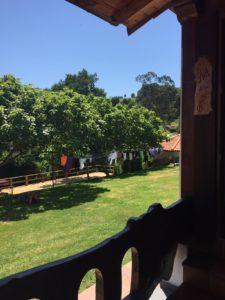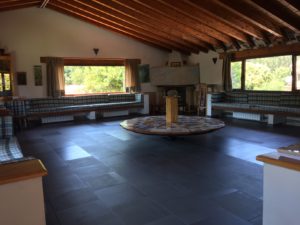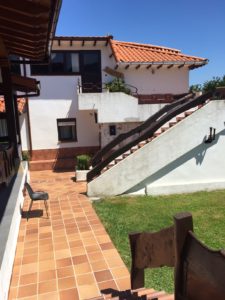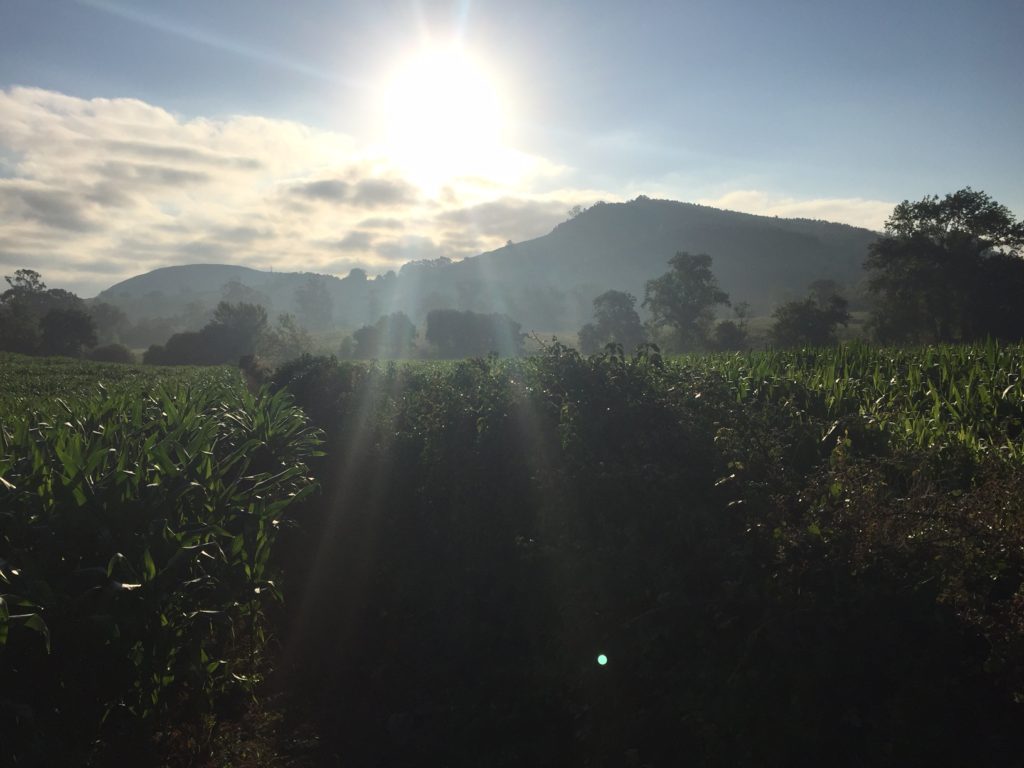sabbath hostage
I fall asleep most nights
lulled by voices speaking
languages I cannot understand
Two weeks ago, I was saying goodbye to the people I love, planning when I would be back; I was flying away from home, a day of airports in multiple states, multiple countries. I knew nothing but anticipation.
Now here I was. I’d met Begoña that first night, and we were already becoming friends. I hugged and kissed Pauline and Antoine with true love and affection whenever I saw them, my friends from Marisa’s house. Francesca was a treasure, so like my youngest daughter in appearance, so like young me in her choices. Pablo and I planned to share many future conversations. And so many more peregrinos that I knew on sight, some by name, some as The Dane or The French Couple, many friends, even if they were only Camino friends, which could often be just enough for the journey to proceed well.
I noticed I was simplifying my speech in English; it made it easier for others to translate back into their own languages. I did this enough that at dinner one night, everyone assumed I was European of some sort until the French man asked directly, “And where are you from?” and once told I was American, added, “Maybe you will be European by the end of the Camino, no?” I responded that I hoped so, causing laughter and cheers around the table. One can dream.
The Camino unrolled with kindness and laughter and good intentions. But that road paved with good intentions could be difficult to navigate, especially with a language barrier.
When I missed getting a bed at the Noja albergue, I walked a couple hours into the town of Meruelo, where the tourist office guide had said I would easily find the albergue: “You can just ask anyone on the street, so easy.” So I did. I asked several people, and they all gave me the same confused look and reply: “No albergue en Meruelo.”
What the hell. I saw no signs, no arrows, and was beginning to wonder what to try next, when an older man overheard my queries and, by saying, “Aqui, aqui,” with gestures to follow him, led me to a private home. As he ushered me toward a gate that led to a secluded back door, I hung back, giving him a distrustful eye. He appeared somewhat distressed by my refusal to follow, so he added, “mi hermana, mi hermana,” and reluctantly I stepped past the gate and edged toward the door. He threw up his hands and entered the back door, and soon he reappeared with a woman about my age, his sister, walking with crutches under both arms. She smiled and bid me “buenos dias” as she led us slowly out the gate, down a steep sidestreet to another house. They both went inside as dogs barked wildly behind a high hedge of overgrown bushes, behind which several young men sat or stood in a small yard. The young men peeked out through the bushes, speaking in rapid Spanish to each other.
Finally, the older man came out with a young woman of about 20 who spoke English, though somewhat timidly. She said that since it was evening, the man (her uncle) wanted to give me a ride to the albergue, and she would come along so I would not be alone. I thanked her, and explained, as we loaded my pack into the back of the tiny hatchback and I clambered into the back seat, that I had a bed waiting for me at the albergue in Meruelo.
She relayed this information to the man, who shook his head, telling her repeatedly in Spanish that the albergue for peregrinos is in Guemes – we have no albergue in Meruelo. So he proceeded to drive me out of town toward Guemes.
However, as we were leaving town, I saw symbols painted on the back of a signpost, an A with an arrow in Camino yellow (the symbol for “albergue”) with “1 km” painted underneath. I told the girl, “See? Albergue sign! It’s only 1 km. Please ask him to stop.” She told the man, who promptly ignored us both, repeating his line like a refrain: YES, We Have NO Albergue, They Have The – Albergue – In Guemes! So I got louder and louder, speaking over his ridiculously repetitious denial like a lunatic backseat driver hostage, saying, “No, please stop. NO, stop now. NO, STOP AND LET ME OUT. LET ME OUT! HE MUST STOP NOW!!!” Once I reached a fever pitch, aka Spanish Conversational Argument Tone, he stopped the car and asked more quietly, “Oh, she wants out here?”
I threw open the car door before it had quite come to a stop, grabbed my pack from the hatch and slammed it shut as I repeated, “Gracias, gracias, gracias,” closing the car door mid-“gracias” and quickly walking away in the other direction. I had just added an extra kilometer to my walk by letting them “help.” Also, he’d been drinking. But truly, all of Spain drinks, so this was not really a problem of driving per se, so much as a problem of stubborn Spanish opinions. I was becoming a local, apparently.
There is no albergue in Meruelo. Except there is. It is beautiful, clean, serves meals, and is just after the small rio – the road bends right, and it sits beside the cornfield. As the very old man on the quiet country road told me. In his very soft voice. Once I had calmed down, by walking the Camino Standard 2km. Muchas gracias, señor. Buen Sábado.
* * * * * * * * * * * * * * * * *
 Guemes. By 11am, I had already put away my boots and taken a shower. By noon, my clean laundry was drying on the clothesline, and I was adding up mileage to see how far I’d come.
Guemes. By 11am, I had already put away my boots and taken a shower. By noon, my clean laundry was drying on the clothesline, and I was adding up mileage to see how far I’d come.
How beautiful is a day of rest. And, fittingly, it was Sunday.
I couldn’t explain to Uncle Meruelo in the car last night that I had a plan, to keep my bed at the local albergue so I could spend the following entire day at Guemes, the Aspen resort of albergues donativos. But Guemes was so much more than that kind of beautiful.
Ernesto, who runs it, is still a “working priest,” meaning he has a job, and also serves his community, and also often reads the Mass, as he did yesterday. Twice. Plus his third Mass, which he calls “Social Mass,” in which he goes to three bars and has a glass of wine at each, talking to the people – because he says reading the Mass is a soliloquy, but these Social Masses are dialogue, and therefore much more important. Thus we met Father Ernesto.
He decided to be a priest at age 15, and was sent to isolated, fractious locations where he would successfully rally and organize the people to improve their situations and their communities. Ernesto was 80 now, and had served on four continents, taking his trusty old Land Rover, with over 700,000 km on the odometer, from remote regions in South America to Senegal in Africa.
In his later years, he joined forces with a social worker in the local prison, who had the inmates growing beans. These they then sold to pay for a remote school – all its needs, books, uniforms, food, everything. In this way, the prisoners were actually caring for these children’s futures.
 Guemes’ projects had no funding except donations, Father Ernesto explained before dinner, as we all sat in a beautiful family compound of 75 pilgrims – that could accommodate 100. The kitchen/dining room building was the home where Ernesto was born; everything else had been added on, little by little, buildings or projects, over 35 years. The years I had been taking care of children, and doing social work, so had Father Ernesto.
Guemes’ projects had no funding except donations, Father Ernesto explained before dinner, as we all sat in a beautiful family compound of 75 pilgrims – that could accommodate 100. The kitchen/dining room building was the home where Ernesto was born; everything else had been added on, little by little, buildings or projects, over 35 years. The years I had been taking care of children, and doing social work, so had Father Ernesto.
The intention and impact of their service was all explained with such intelligence, grace, and humor that of course we all wanted to help them. When I left home, one of my dearest friends gave me extra money, saying, “You’ll know when it’s the right time to use it. Splurge.” So I gave 50 euros to Ernesto’s children and prisoners and albergue. I did it on the sly, just tucked the folded note into the donation box anonymously.
Part of me wanted to join them, help with this work of giving both prisoners and children a future, people who would easily become homeless, become my clients back home, if not supported and given purpose. I remembered giving tours at our resource center and at our housing site, and becoming insulted and angry inside when obviously wealthy people strolled through our facilities, smiling uncomfortably at the people they passed, and ending their tour with obvious relief, telling me the same line week after week, month after month, year after year: “God bless you for what you do.” All those years, I wanted to yell back at them, “‘God bless us everyone?’ For God’s sake, get down out of your Mercedes and HELP ME.”
I didn’t say it, but I meant it. We had relied on donations too, and grants that required applications and reports, quantifying people’s lives into tallied outcomes. Just to continue to receive small amounts of money to allow them the dignity of a bed, a shower, a cooked meal, and someone to talk to. All the things I received at the albergues.
The difference was, I was currently homeless by choice. True choice, as I had intentionally sold my house and saved money in the bank to pay my way. But the freedom of leaving the workweek/ weekend cycle of the full-time steady job came with a price. Guilt. I didn’t feel it all the time, but at moments like that, reminded of all the people who toss platitudes and run for the exit while you stay, every day – that’s when it would hit. My self-concept was built on the bedrock of “hard working.” Yet here I was, walking the Camino, every day a Sunday, every week a weekend.
 I stuck to my resolve, to the statement I had made to everyone who offered possible part-time work options upon my return: “I can’t make a choice right now. Because I don’t know who I will be when I get back.”
I stuck to my resolve, to the statement I had made to everyone who offered possible part-time work options upon my return: “I can’t make a choice right now. Because I don’t know who I will be when I get back.”
I didn’t know why it was so important until I reached Guemes. But the part of me that was not a social worker, the reclaimed poet and artist and singer, needed time – a month of Sundays, as they say. At the very least. So I decided I was okay with just giving Father Ernesto my friend’s money that day, resisting the urge to tell anyone, sincerely, from one who knows – God bless you for the work you do. Because they were already blessed. You could feel it.
Instead of joining the work, during my day at Guemes I was fed my one-and-only albergue lunch of salad, soup, bread and wine; this prompted a nap in the sun. After writing in my notebook for hours, supper was pasta, more soup, more bread and wine, and a nectarine for dessert. We sat at a half-dozen long wooden tables in the low house that had been Ernesto’s home, meeting and greeting each other over food and drink with the conviviality of living outside the tyranny of time.
I sat by Danish Svend and his polite but slightly intimidating friend, as well as two Danish women. I asked the women about the Danish concept of hygge, plus how to correctly pronounce the word. It’s tricky, not so easy to get used to, softer than it appears – and the pronunciation is all those things, too.
Because hygge meant exactly what we were experiencing: being together in someone’s home, eating and drinking and enjoying each other, all without worry of time or responsibility. It was about closeness, friendliness, easy fun. Like when all the tables joined forces in teasing the Germans that they just HIKE! HIKE! HIKE! and don’t know how to have a good time, our uproarious laughter creating a running joke on the Camino for weeks to come.
As I left the next morning, Svend told me, “Barbara, we have learned that the way is more important than the pace – so we hike the slow Camino,” and smiled and shook my hand, thanking me for talking about my dawdling journey. Turned out, only Svend’s name was Danish – he and his friend were German!
Maybe my slow pace was catching on?
Who’s to say. Hygge Camino.
what is this sabbath
I have found
a singing walk
to a warm shower
clothes like flags
our countries flutter
from the line
and the bell calls
to practice
comraderie
over salad
with olives like surprises
commiseration
over soup
potato and chorizo
in tomato broth of
all our walking
communion
as our glasses clink
with the wine
of the joy
of rest

